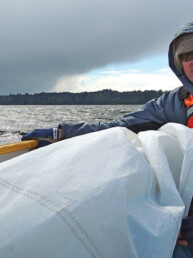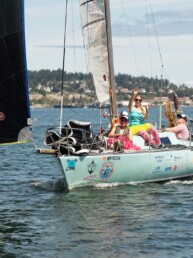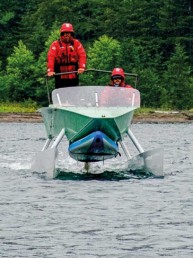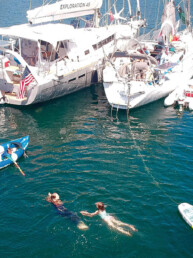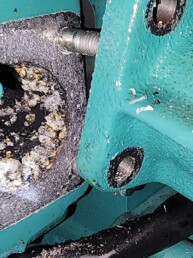This article was originally published in the January 2022 issue of 48° North.
It’s hard to compete with a chicken — but I felt like I needed to after being invited for dinner aboard a sizable motor cruiser near Johnstone Strait. Having served a few drinks and an appetizer, my host turned to the oven (a luxury to me) and pulled out a roasted chicken. I was momentarily struck speechless. “Where did you get that?” I stammered.
“Oh, we’ve got a freezer down below,” he said casually.
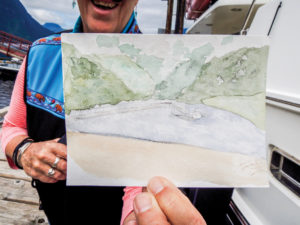
That’s when I felt the need to reciprocate with something equally special. At 18-feet, Row Bird is not equipped for culinary feats like roasting a chicken — or even a piece of one. Still, I was prepared for this moment.
Sailors of big boats may not realize it, but when packing for a small craft cruise, tough choices must be made. There’s limited space to stow essentials while leaving room to sail or row comfortably and safely. After accounting for water, safety equipment, weather duds, sleeping gear, and food, I turn my attention to the final item on my packing list: trade goods.
What are trade goods? I consider them to be any non-essential, yet socially critical item taken on a voyage. These are the things I share when I feel compelled to compete with a chicken.
From my earliest days on the water, I’ve been struck by the kindness and hospitality of my fellow sailors, who’ve offered me everything from fresh banana bread on a cool morning, to a tow, to drinks at sunset. So even on an overnighter, I make a point of bringing something I can offer too. I don’t know who I’ll encounter, or when, but I’ve experienced the goodwill that even the simplest trade goods invoke on a quiet bay, miles from the nearest store.
During my first ever cruise, a three-week rowing trip, I made small refrigerator magnets with a woodcut image of my boat Terrapin set amidst a sea of waves. A stack of them took up less room than a deck of cards, yet produced smiles and provided a great conversation starter when I met new people.
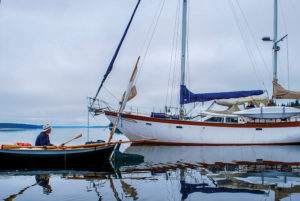
Over the years, I’ve tried a variety of small, sharable items with mixed success. Sometimes I’ve brought along bags of dried apples. After all, fruit prevents scurvy, right? Some welcomed this treat, while others eyed my home-picked and preserved fruit with trepidation. Shortbread looked attractive, and its sprinkles sparkled in the cute glassine bags my wife gamely tied with ribbons. But despite a long shelf life and high caloric value for fellow rowers, they tended to get crushed, and those little bags ended up resembling small sacks of flour, rather than valuable trade goods. Ginger snaps, on the other hand, I discovered are pliable enough to stand up to abuse, look nice, and stay fresh for a long time. I’ve handed them out in little bags and straight out of a big plastic tub, always to enthusiastic audiences.
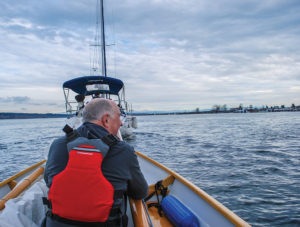
A stalwart on even the shortest journey are my little homemade magazines (known as zines). Each one contains some of the best stories I’ve written, along with a smattering of my nautical photographs. Some years ago, I carried a handful to England, where one morning I was invited to row with locals on a traditional wooden Thames skiff. Boating on the serene upper Thames, where tidal gates control the flow, is a world of difference from the open waters of the Columbia River, and afterwards I was happy to share my zines with my London hosts, hoping they would enjoy my stories of Pacific Northwest adventures.
Pre-Covid, on the last day of a long trip, I paused on the edge of the San Juan Islands. There I met a sailor on the dock at James Island State Park. After sharing a meal together, I realized I was completely out of my usual trade goods; wanting to be a good guest, I returned to Row Bird in search of a treat. As I dug deep in my forward locker, my hand found the edge of a forgotten cardboard box. It contained a packet of Canadian maple leaf cookies that I’d picked up a week earlier on Vancouver Island. It didn’t meet my high standards, but my new friend was impressed; after all the cookies were dry, intact, and had crossed an international boundary by human power. Not a single cookie made it off the island.
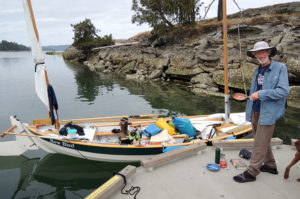 Ultimately, it doesn’t matter what trade goods I bring on a voyage. As fellow boaters, we’re all looking less for physical objects, and more for the fun of spinning a good yarn and relishing the company of others who share our love of the water. Still, it’s nice to have something to share.
Ultimately, it doesn’t matter what trade goods I bring on a voyage. As fellow boaters, we’re all looking less for physical objects, and more for the fun of spinning a good yarn and relishing the company of others who share our love of the water. Still, it’s nice to have something to share.
In the case of that chicken meal, it was a stack of oat cakes from a curious family recipe, sort of a cookie without the sugar. They lack visual pizazz, but travel well and have an indefinite lifespan (much like waybread from Lord of the Rings). However, when slathered in honey, they’re simply unbeatable — and my host found them as irresistible as I did the chicken.
Bruce Bateau
Bruce Bateau sails and rows traditional boats with a modern twist in Portland, Ore. His stories and adventures can be found at www.terrapintales.wordpress.com

